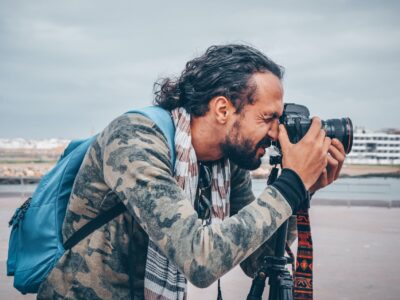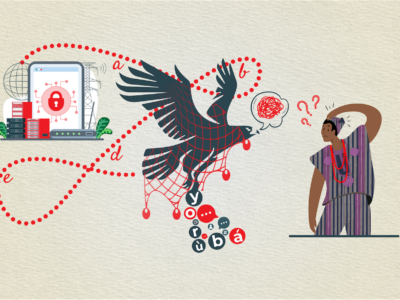
Global Accessibility Awareness Day logo (Mindymorgan, CC BY-SA 4.0, via Wikimedia Commons)
Rising Voices note: Our monthly newsletter provides a summary of our recent blog posts about all aspects of digital inclusion including access and adoption of digital tools, as well as different ways and opportunities for communities to fully participate online. Read here for previous editions of this newsletter.
Hello readers, how are you enjoying May? We hope our newsletter finds you in a positive spirit.
While the internet has become an indispensable part of daily life for many of us, it is not equally accessible to everyone around the world. Other than the lack of infrastructure and digital literacy, disability is a big factor that comes into play.
Chances are that we have all stumbled upon a webpage that’s so poorly designed that we couldn’t even wrap our head around where to look for what or the layout is simply too distracting for us to try going over its content. The fonts are too small, the colors are too dim… and we end up having to give up on the web-based service that’s supposed to be available to all. How frustrating is that? Yet, it’s routine for many with a disability.
Therefore, on this upcoming Global Accessibility Awareness Day (May 19), we are inviting you to spend a moment reflecting upon the importance of digital accessibility and what each of us can do for better inclusion. We’d love to hear what you think!
MORE FROM THE RISING VOICES BLOG
Embarking on the IDIL2022–2032 journey with language activists from around the world, Rising Voices and partners are bringing to you another round of our rotating Twitter campaigns. Curious about indigenous, minority, endangered, or under-resourced languages plus how the internet and technology play a role in their promotion and revitalization? Come follow us and hear what our guest hosts have to share!
@ActLenguas (Latin America)
- Tù'un Sà'án Sàvǐ ñà Yukúnanǐ Project [es] on Yucunani Mixtec (Sà'án Sàvǐ), spoken in San Juan Mixtepec of Oaxaca, Mexico
- Jhonnatan Rangel [es] on Ayapaneco, spoken in Tabasco, Mexico
- Selene Galindo/Masa'n [es] on O’dam (a Uto-Aztecan language), spoken in Durango, Mexico
- Luis Ramón Alvarado Pascasio [es] on Tseltal (a Mayan language), spoken in Chiapas, Mexico
@AsiaLangsOnline (Asia)
- Amrit Sufi on Angika, spoken primarily in Bihar, India
- Zubair Torwali on Torwali, spoken in northern Pakistan
@DigiAfricanLang (Africa)
- Ọmọ Yoòbá on Yorùbá, spoken primarily in Southwestern Nigeria
- Oratile Olivia Gabaphethe on Setswana, native to South Africa and Botswana
@EuroDigitalLang (Europe)
- Mirjam Vellinga on Frisian, spoken in Fryslân, Netherlands
Along these lines, please follow us to the Navarino Island of Chile and revisit the memory of a Yaghan language activist, who passed away at the age of 93 this February. → “The legacy of Chile's last Yaghan speaker lives on”
We’d also love to have you join us in understanding what media diversity has to do with biodiversity, as well as how internet access, coupled with media training, can foster discussions over important issues of climate change and the environment. → “Reframing narratives about climate change in Bolivia’s Gran Chaco region”
FUNDING
Having a story to tell the world but are strained for funds? The IDFA Bertha Fund seeks to support qualifying filming projects by way of various funding opportunities. Please see here for three deadlines upcoming in June.
OPPORTUNITIES | JOBS
The Endangered Languages Project is now taking applications for its 2022 summer internships! If you are a digital-savvy person, who has a love for indigenous and endangered languages, this would be a great chance to apply your skills to your passion and gain experiences in language documentation and revitalization (details here). Review starts: May 19, 2022
MORE TO READ, WATCH and LISTEN TO
- Why embarking on accessibility work in the digital rights community is important via Team CommUNITY @ ARTICLE 19
- Digital Platforms Provide Community for People with Physical Disabilities, If Websites Are Accessible via InclusionHub
- Improving Web Content Accessibility Guidelines (WCAG) for Mental Health Disabilities via InclusionHub
Subscribe to the Rising Voices Newsletter
Support our work
Since Rising Voices launched in 2007, we’ve supported nearly 100 underrepresented communities through training, mentoring, microgrants and connections with peer networks. Our support has helped these groups develop bottom-up approaches to using technology and the internet to meet their needs and enhance their lives.
Please consider making a donation to help us continue this work.



